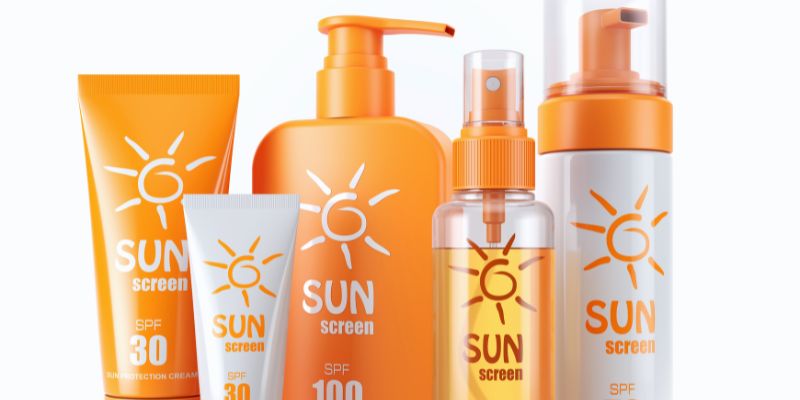Physical Vs. Chemical Sunscreen: Key Differences That You Should Know
Selecting the correct sunscreen will help shield your skin from damaging UV light. Given the abundance of choices, choosing which kind is ideal for you might be taxing. Physical and chemical sunscreen are two often used options. Both strive to shield your skin from the sun, even if they operate differently. Chemical sunscreen absorbs UV radiation and turns it into heat; physical sunscreen reflects UV rays and forms a protective layer on the skin.
Knowing how each kind operates and its benefits and drawbacks will guide you to make wise decisions. This guide will help you find the finest sunscreen for your needs, whether your sensitive skin needs something mild or you want a lightweight daily-use solution. Let's explore the main variances to choose the ideal sun protection for your skin!

What Is Physical Sunscreen, And How Does It Work?
Physical sunscreen, also known as mineral sunscreen, is a form of UV protection that uses naturally occurring minerals like zinc oxide and titanium dioxide. These active components create a surface-covering protective layer on your skin. Physical sunscreen reflects and scatters damaging UV rays away from the skin, not absorbing like chemical sunscreens. This special mechanism shields from both UVB and UVA radiation in a broad spectrum.
Physical sunscreen is notable for starting to function right away after application. Unlike chemical sunscreens that take time to absorb, physical sunscreen protects you immediately upon application. Since it's less likely to irritate sensitive or acne-prone skin, it's an excellent choice for those. Furthermore, more stable under sunshine are physical sunscreens, which guarantee consistent protection without readily breaking down.
Key Ingredients in Physical Sunscreen
The main ingredients in physical sunscreen are:
- Zinc oxide
- Titanium dioxide
These ingredients are often preferred for sensitive skin. They shield broad-spectrum against UVB and UVA radiation.
Benefits of Physical Sunscreen
- Immediate Protection: It starts working right away after application.
- Less Irritating: Great for sensitive and acne-prone skin.
- Stable Ingredients: It does not degrade in sunlight.
- Good for Children: Often recommended for babies and young kids.
Drawbacks of Physical Sunscreen
- Can Leave a White Cast: Some physical sunscreens leave a visible white layer on the skin.
- Not Always Sweat-Proof: May wear off more quickly in water and sweat.
What Is Chemical Sunscreen, And How Does It Work?
Chemical sunscreen uses organic molecules, including avobenzone, oxybenzone, and octinoxate, which are some of the UV protections. These active components pick up UV rays and turn them into heat, which the skin releases. Chemical sunscreens protect from the inside rather than the physical ones on the skin's surface. Daily sunscreen is commonly used since it is lightweight and integrates readily into the skin without creating a white cast.
Chemical sunscreens, on the other hand, need time to bond with the skin; hence, they take 20–30 minutes to become effective after application. They are suitable for outdoor activities since they usually provide superior water and perspiration resistance. However, some components of chemical sunscreens could irritate delicate skin or break down during extended sun exposure, so reapplication is required.
Key Ingredients in Chemical Sunscreen
Common chemical sunscreen ingredients include:
- Avobenzone
- Octinoxate
- Oxybenzone
- Homosalate
These ingredients provide good coverage against UVA and UVB rays.
Benefits of Chemical Sunscreen
- No White Cast: It blends more easily into the skin without a visible layer.
- Lightweight Formula: Often feels lighter and smoother on the skin.
- Better for Sports and Water Activities: Often more sweat and water-resistant.
Drawbacks of Chemical Sunscreen
- Less Stable in Sunlight: Ingredients can break down with prolonged sun exposure.
- Potential Irritation: Some ingredients can irritate sensitive or acne-prone skin.

Key Differences Between Physical and Chemical Sunscreen
Knowing the main distinctions between chemical and physical sunscreen will enable you to choose with knowledge. Let's simplify it for you.
- How They Work: Physical sunscreens defend the skin from damage by bouncing UV radiation away. This system stops damaging UVB and UVA from getting through the skin. Conversely, chemical sunscreens absorb UV light and convert it into heat that the skin releases.
- Application and Effectiveness: Perfect for rapid protection, physical sunscreens act immediately upon application. However, they usually leave the skin white. Chemical sunscreens must be absorbed, so they take 20 to 30 minutes to start working. They mix effortlessly without creating any obvious layers.
- Skin Sensitivity: Physical sunscreens are gentler on the skin and appropriate for delicate, acne-prone, or youthful skin. Because of their active components, chemical sunscreens, which are lightweight and invisible, may occasionally irritate delicate skin.
- Stability in Sunlight: Consistent protection comes from physical sunscreens, which stay steady under UV light. However, chemical sunscreens lose their efficacy over extended sunshine since they break down. Maintaining protection often requires reapplication.
- Water and Sweat Resistance: Chemical sunscreens are generally more resilient and work better in water or during sweaty activities. Physical sunscreens may fade faster in these environments and need regular reapplying.
Which Sunscreen Should You Use?
Your skin type, way of life, and personal preferences will all influence whether you choose physical or chemical sunscreen. Those with sensitive skin, acne-prone skin, or young children will find physical sunscreen an excellent choice. Its mild, non-irritating mix offers consistent sun protection and is free from skin sensitivities. Since it acts immediately upon application, it is also perfect if you require instant protection. Conversely, people looking for a lightweight, undetectable finish would find chemical sunscreen more appropriate.
It's perfect for everyday wear under makeup since it naturally mixes with the skin. Chemical sunscreen might be more efficient if you participate in water activities or sweat extensively since it provides superior water and sweat resistance. Physical sunscreen is a better option, but if you have questions about skin irritation or require protection in very strong sunlight since it is durable during UV exposure, The best sunscreen is ultimately the one you will apply regularly.
Conclusion:
Protecting your skin from damaging UV radiation depends on selecting the correct sunscreen. Both physical and chemical sunscreens provide good sun protection, although they satisfy different purposes. While chemical sunscreens shine in mixing easily and repelling water and sweat, physical sunscreens are perfect for delicate skin, with instant protection and stability under sunshine. Your skin type, lifestyle, and tastes will all determine your pick. The key is consistency; apply and reapply sunblock as advised for optimal effects. Whether your preferred form is physical or chemical, everyday sunscreen protects the health of your skin and stops long-term harm from sun exposure.












